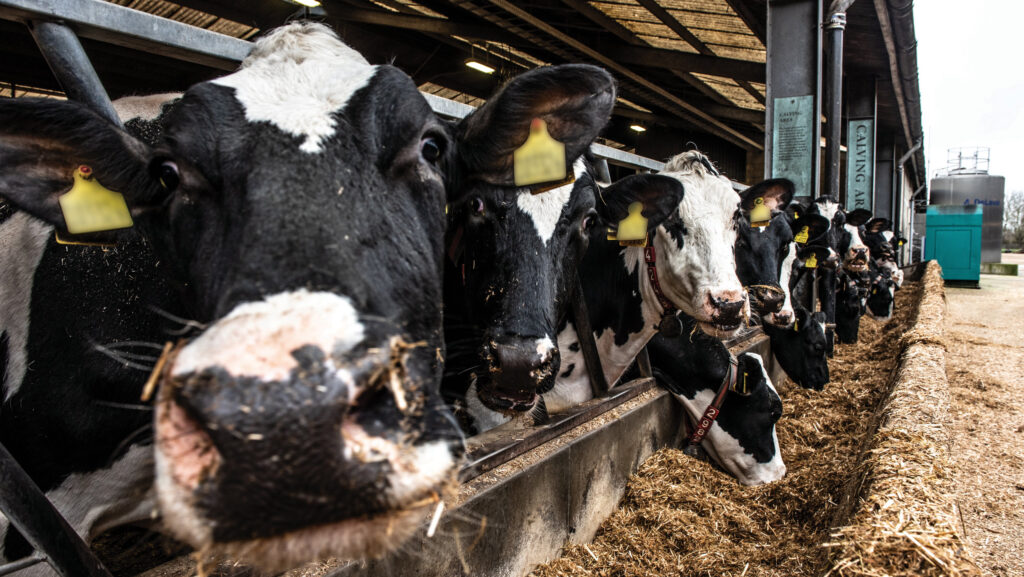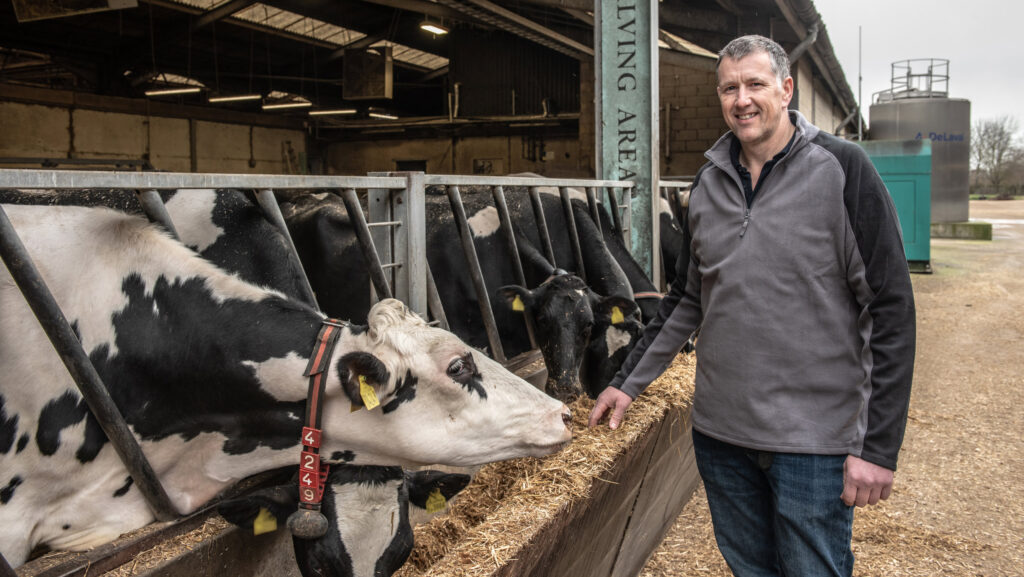FW’s Transition Live unites farmers for talks on key issues
 Park Farm © Phil Weedon
Park Farm © Phil Weedon Hundreds of farmers and growers have already booked their places at Farmers Weekly’s Transition Live event on 9 May.
The event, held at Cambridge University’s mixed, arable and dairy farm, is part of Farmers Weekly’s Transition initiative, which aims to explain the complex production, policy and environmental issues facing British farmers.
The day will start with a keynote address, followed by talks and panel discussions. Speakers will include farmers, researchers, policymakers and industry specialists, who will cover three key areas:
- Food production
- Environment
- Business.
There will be opportunities to put questions to the industry experts, compare notes with other farmers, share ideas and talk to the host dairy farm manager.
Transition Live host farm
Visitors to Transition Live will hear how Cambridge University’s farm manager, Paul Kelly, has improved the herd’s carbon footprint while cutting costs and boosting efficiency.
The farm has a housed 230-cow Holstein Friesian dairy herd, a 265ha contract-managed arable unit and a flock of 250 North Country Mules.
It also operates as a Linking Environment and Farming (Leaf) demonstration unit and a commercial business that is battling with the same environmental, production and policy challenges facing farmers across the UK.

Transition Live host farmer Paul Kelly © Phil Weedon
A recent audit of the dairy unit showed the carbon output has been cut from 1.27kg/kg fat and protein corrected milk (FCPM) to 1.04kg/kg FCPM since 2019, when Paul joined the team.
This has been achieved with investments in slurry handling, housing improvements and the installation of a small 44kW slurry-fed anaerobic digester (AD) plant.
The dairy herd produces 13,000cu m of slurry a year and it was costing up to £40,000 annually to export slurry because they didn’t have sufficient storage, says Paul.
To resolve this, a 6,000cu m slurry tank was installed in 2021.
Slurry is now applied to grassland and arable crops, which has reduced artificial fertiliser requirements by 9.25t of ammonium nitrate.
The AD plant produces enough energy to meet half the farm’s needs.
Other efficiencies brought in since Paul joined include LED lighting in the dairy buildings and youngstock sheds, cutting the farm’s carbon output by 19t carbon dioxide equivalent/ year.
Dispensing with soya and using multicut forage regimes have also helped reduce the proportion of bought-in feed, improving the carbon footprint still further.
Looking ahead, Paul hopes to see the farm’s 13-year-old robot milkers with up-to-date and more efficient robots.
“As farm managers, we really have to analyse and adopt new methods and techniques to make us more efficient.
“We have to look to ourselves to take stock and look at what we are doing and see how we can improve,” says Paul.
“To that end, I am looking forward to hearing from the speakers and meeting other farmers to learn from the wealth of knowledge they will bring to this event.”
Date and venue
- Time 9am to 4:30pm
- Date 9 May 2024
- Venue Cambridge University Farm Park Farm, Madingley, Cambridge, CB23 8YW
- Contact If you have any questions, email transitionlive@markallengroup.com or book tickets online
Basis CPD points
Transition Live is a Basis-registered event and attendees can qualify for 3 points. You will need your Basis account number and to complete a form showing your attendance at the designated point on the day.
Agenda
The event opens at 9am with tea and coffee and an opening plenary on regulation, policy and outcomes from Farmers Weekly’s Transition editor, Johann Tasker, as well as a welcome from one of the team at Cambridge University Farm.
The afternoon sessions will open with a keynote address.
Talks and panel discussions |
||
|
Food production |
Environment |
Business |
|
Optimising margins in arable Headline speaker: Edward Vipond, farms manager, Troston Farms
|
Generating an income from natural capital Headline speaker: Emily Norton, director, Soil Association Exchange Partnered with Environment Bank |
How to take risk out of your farm business Headline speaker: Nick Down, head of sustainability, Velcourt Partnered with Strutt & Parker |
|
Securing the future for livestock production Headline speaker: Professor Jude Capper, Partnered with AB Agri and KW |
Next steps in improving soil health Headline speaker: Professor Jackie Stroud, Partnered with Claydon Drills |
Land use change: Managing capital, cash and tax Headline speaker: Johnny Wake, managing partner, Courteenhall Estate Partnered with GSC Grays |
|
A smarter approach to crop production Headline speaker: Dr Simon Griffiths, Partnered with Bayer |
Carbon farming: How to get it right Headline speaker: Dr Liz Genever, beef and sheep consultant, Liz Genever Consulting Partnered with Agreena |
Long-term planning to family farming Headline speaker: Professor Matt Lobley,
|
|
Adding value through collaboration Headline speaker: Gary Markham, director, Partnered with UPL |
Trees on the farm Headline speaker: Stephen Briggs, farmer and lead consultant, Abacus Agriculture Partnered with Wanderlands |
Diversification or specialisation: Which is best? Headline speaker: David Linton, Barenbrug UK
|
|
Generating revenue from landscape-scale Headline speaker: Tim Field, North East Cotswold Farmer Cluster Partnered with Frontier |
Making renewable energy work on your farm Headline speaker: Jonathan Scurlock, NFU chief adviser, renewable energy and climate Partnered with Lightsource BP |
How to improve and reward sustainable agriculture Headline speaker: Liz Bowles, chief executive, Partnered with Lloyds Bank |
Headline speaker insight
Food production
Professor Jude Capper of Harper Adams University, who is also ABP chairman, will outline the “Securing the future for livestock production” topic before the expert panel takes up the discussion.
She will look at ruminant livestock and set out why they are integral to sustainable farm systems.
The positive effects of livestock on soil health, biodiversity and landscape maintenance are overlooked, leaving farming’s detractors to misrepresent the contribution of farmed animals, says Jude.
The benefits and contributions, which will be set out and discussed, need to be better communicated to all stakeholders, she suggests.
Business
Liz Bowles, Farm Carbon Toolkit chief executive, will cover how to improve and reward sustainable agriculture.
Liz has recently prepared a key report on the financial and climate effects of regenerative farming.
But she will look beyond regen at how to farm sustainably. Understanding the financial effect of climate change is vital for farmers and policymakers, says Liz.
If more people appreciated the costs of climate change, it would aid planning, she says.
The role of external funding, and whether it goes far enough to make farms sustainable, will also be discussed.
Environment
Beef and sheep consultant Liz Genever will open discussions on carbon farming and how to get it right.
Liz explains that she will set out the principles of getting carbon into the soil through organic matter and look at the potential role of livestock in rotations.
Feeding the soil with organic matter will improve its nutrient retention and availability, she says.
This in turn, will promote plant health, cutting carbon losses and reducing artificial inputs. Liz will also look at the role of improved soil structure and how it delivers better carbon retention and water management.
Panellists
Transition Live also boasts a wealth of experience across its panels, which will discuss and widen the topics set out by the headline speakers.
- Jo Franklin Farmer, Kaiapoi
- Patrick Barker Farmer, EJ Barker & Sons
- Flavian Obiero Tenant farmer and farm apprentice butcher, Tynefield Farm
- Tanya Coleman Principal consultant, Kite Consulting
- Lee Reeves UK head of agriculture, Lloyds Bank
- Molly Bidell Head of natural capital, Knepp
- Rory Hodgson Senior land manager – South East, Environment Bank
- Jonathan Armitage Head of farming, Strutt & Parker
- Joe Stanley Head of sustainable farming, GWCT’s Allerton Project
- Thomas Gent UK market lead, Agreena
- James Small Partner, Small Bros
- Sean McCann Chartered financial partner, NFU Mutual
- Stuart Jackson Head of technical for UK and IE, UPL
- Vicky Robinson Head of sustainability, Agricultural Industries Confederation
- Tim Oliver Founder, Wanderlands
- Tom Bosson Relationship director, Lombard
- Ben Bell Digital activation specialist, Bayer Cropscience
